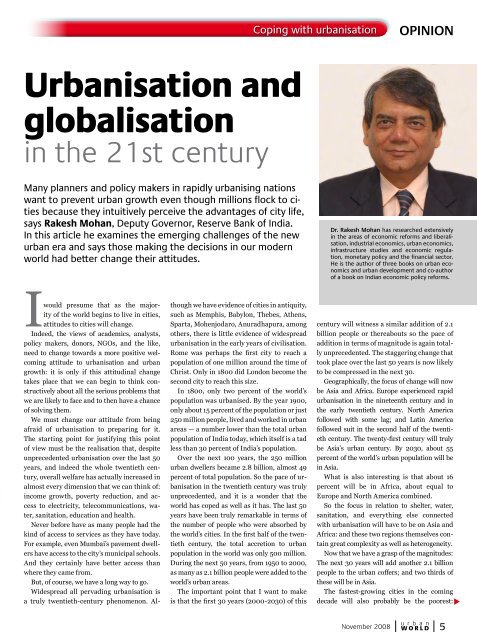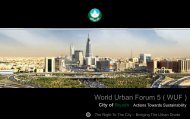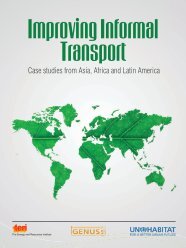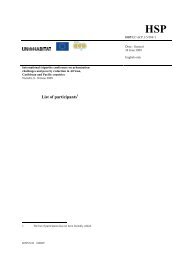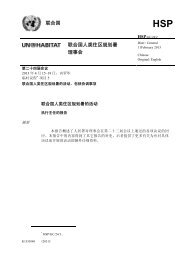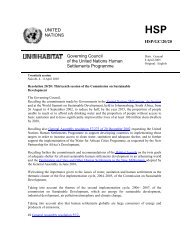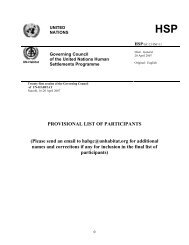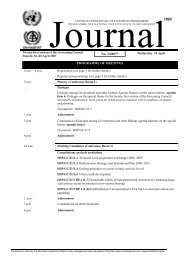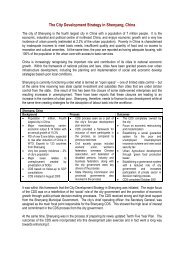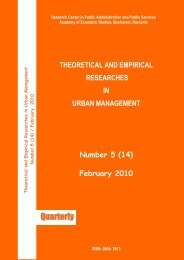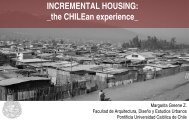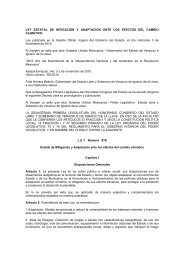Harmonious cities - UN-Habitat
Harmonious cities - UN-Habitat
Harmonious cities - UN-Habitat
You also want an ePaper? Increase the reach of your titles
YUMPU automatically turns print PDFs into web optimized ePapers that Google loves.
Urbanisation and<br />
globalisation<br />
in the 21st century<br />
Many planners and policy makers in rapidly urbanising nations<br />
want to prevent urban growth even though millions flock to <strong>cities</strong><br />
because they intuitively perceive the advantages of city life,<br />
says Rakesh Mohan, Deputy Governor, Reserve Bank of India.<br />
In this article he examines the emerging challenges of the new<br />
urban era and says those making the decisions in our modern<br />
world had better change their attitudes.<br />
I would presume that as the majority<br />
of the world begins to live in <strong>cities</strong>,<br />
attitudes to <strong>cities</strong> will change.<br />
Indeed, the views of academics, analysts,<br />
policy makers, donors, NGOs, and the like,<br />
need to change towards a more positive welcoming<br />
attitude to urbanisation and urban<br />
growth: it is only if this attitudinal change<br />
takes place that we can begin to think constructively<br />
about all the serious problems that<br />
we are likely to face and to then have a chance<br />
of solving them.<br />
We must change our attitude from being<br />
afraid of urbanisation to preparing for it.<br />
The starting point for justifying this point<br />
of view must be the realisation that, despite<br />
unprecedented urbanisation over the last 50<br />
years, and indeed the whole twentieth century,<br />
overall welfare has actually increased in<br />
almost every dimension that we can think of:<br />
income growth, poverty reduction, and access<br />
to electricity, telecommunications, water,<br />
sanitation, education and health.<br />
Never before have as many people had the<br />
kind of access to services as they have today.<br />
For example, even Mumbai’s pavement dwellers<br />
have access to the city’s municipal schools.<br />
And they certainly have better access than<br />
where they came from.<br />
But, of course, we have a long way to go.<br />
Widespread all pervading urbanisation is<br />
a truly twentieth-century phenomenon. Al-<br />
though we have evidence of <strong>cities</strong> in antiquity,<br />
such as Memphis, Babylon, Thebes, Athens,<br />
Sparta, Mohenjodaro, Anuradhapura, among<br />
others, there is little evidence of widespread<br />
urbanisation in the early years of civilisation.<br />
Rome was perhaps the first city to reach a<br />
population of one million around the time of<br />
Christ. Only in 1800 did London become the<br />
second city to reach this size.<br />
In 1800, only two percent of the world’s<br />
population was urbanised. By the year 1900,<br />
only about 15 percent of the population or just<br />
250 million people, lived and worked in urban<br />
areas — a number lower than the total urban<br />
population of India today, which itself is a tad<br />
less than 30 percent of India’s population.<br />
Over the next 100 years, the 250 million<br />
urban dwellers became 2.8 billion, almost 49<br />
percent of total population. So the pace of urbanisation<br />
in the twentieth century was truly<br />
unprecedented, and it is a wonder that the<br />
world has coped as well as it has. The last 50<br />
years have been truly remarkable in terms of<br />
the number of people who were absorbed by<br />
the world’s <strong>cities</strong>. In the first half of the twentieth<br />
century, the total accretion to urban<br />
population in the world was only 500 million.<br />
During the next 50 years, from 1950 to 2000,<br />
as many as 2.1 billion people were added to the<br />
world’s urban areas.<br />
The important point that I want to make<br />
is that the first 30 years (2000-2030) of this<br />
Coping with urbanisation<br />
OPINION<br />
Dr. Rakesh Mohan has researched extensively<br />
in the areas of economic reforms and liberalisation,<br />
industrial economics, urban economics,<br />
infrastructure studies and economic regulation,<br />
monetary policy and the financial sector.<br />
He is the author of three books on urban economics<br />
and urban development and co-author<br />
of a book on Indian economic policy reforms.<br />
century will witness a similar addition of 2.1<br />
billion people or thereabouts so the pace of<br />
addition in terms of magnitude is again totally<br />
unprecedented. The staggering change that<br />
took place over the last 50 years is now likely<br />
to be compressed in the next 30.<br />
Geographically, the focus of change will now<br />
be Asia and Africa. Europe experienced rapid<br />
urbanisation in the nineteenth century and in<br />
the early twentieth century. North America<br />
followed with some lag; and Latin America<br />
followed suit in the second half of the twentieth<br />
century. The twenty-first century will truly<br />
be Asia’s urban century. By 2030, about 55<br />
percent of the world’s urban population will be<br />
in Asia.<br />
What is also interesting is that about 16<br />
percent will be in Africa, about equal to<br />
Europe and North America combined.<br />
So the focus in relation to shelter, water,<br />
sanitation, and everything else connected<br />
with urbanisation will have to be on Asia and<br />
Africa: and these two regions themselves contain<br />
great complexity as well as heterogeneity.<br />
Now that we have a grasp of the magnitudes:<br />
The next 30 years will add another 2.1 billion<br />
people to the urban coffers; and two thirds of<br />
these will be in Asia.<br />
The fastest-growing <strong>cities</strong> in the coming<br />
decade will also probably be the poorest:<br />
u r b a n<br />
November 2008 WORLD 5


